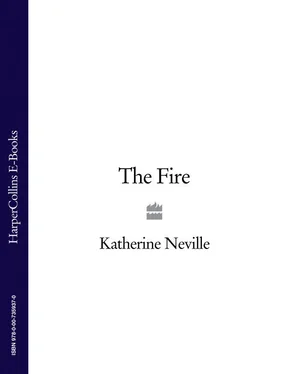The pasha had never issued such a command before. It could not be disobeyed. Haidée was dressed for the trek, in thick kashimir pantaloons and fur-lined boots. But her odalisques – frozen here in indecision upon the bridge – were trembling more from fear than from the cold, unable to move. Sheltered as she’d been in her twelve years, it was clear to young Haidée that these ignorant country girls would prefer the warmth and relative safety of their harem, surrounded by fellow slaves and concubines, to the icy winter lake with its dark and unknown dangers. In truth, she’d prefer it herself.
Haidée silently prayed for a sign of what those terrified screams had meant.
Then, as if in answer to her unspoken request, through the dark morning mist across the lake she could make out the fire that had flamed up like a beacon, illuminating the massive form of the pasha’s palace. Projecting into the lake on its spit of land, its crenellated white granite walls and pointed minarets shimmering in the mist, it seemed to rise from the waters: Demir Kule, the Iron Castle. It was part of a walled fortress, the Castro, at the entrance to the six-kilometer lake and it had been built to withstand the onslaught of ten thousand troops. In these past two years of armed siege by the Ottoman Turks, it had proven impregnable.
Just as impregnable was this strip of craggy, mountainous terrain – Shquiperia, the Eagle’s Country – a wild, unconquerable place ruled by a wild, unconquerable people who called themselves Toska – ‘coarse’ – after the rough, volcanic pumice that had formed this land. The Turks and Greeks called it Albania – the White Land – for those rugged, snowcapped mountains that protected it from attack by land or sea. Its inhabitants, the most ancient race in southeastern Europe, still spoke the ancient tongue – older by far than Illyrian, Macedonian, or Greek: Chimaera, a language comprehended by no one else on earth.
And the wildest and most chimaerical of these was Haidée’s father, red-haired Ali Pasha – Arslan, ‘the Lion,’ as he was called from the age of fourteen, when, alongside his mother and her band of brigands, he’d avenged his father’s death in a ghak, a blood feud, to recover the town of Tebelen. It would be the first of many such ruthless victories.
Now, nearly seventy years later, Ali Tebeleni – Vali of Rumelia, Pasha of Janina – had formed a sea power to rival Algiers and captured all the coastal towns down to Parga, once possessions of the Venetian Empire. He feared no power, east or west. He himself was the most powerful force in the far-flung Ottoman Empire, after the sultan in Constantinople. Too powerful, in fact. That was the trouble.
For weeks now, Ali Pasha had been sequestered, along with a small retinue – twelve of his closest supporters and Haidée’s mother, Vasiliki, the pasha’s favorite wife – in a monastery at the middle of the enormous lake. He was awaiting his pardon from the sultan, Mahmud II, in Constantinople – a pardon now eight days overdue. The only insurance against the pasha’s life was the hard, stony fact of Demir Kule itself. The fortress, defended by six batteries of British mortar, was also packed with twenty thousand pounds of French explosives. The pasha had threatened to destroy it, to blow it to the skies – along with all the treasures and lives within its walls – if the sultan’s promised pardon was not forthcoming.
Haidée understood that it must be for this very reason the pasha had ordered her to be brought to him, under cover of darkness, at this final hour. Her father needed her. She vowed to quell any fears.
But then in the deathly silence Haidée and her chambermaids heard a sound. It was a soft sound, but infinitely terrifying. A sound borne very close by, only meters from where they stood, sheltered here among the high grasses.
The sound of oars, dipping into the water.
As if with one thought, the young girls held their breath and focused upon that lapping sound. They could nearly touch its source.
Through the dense, silvery fog, they could just make out three longboats slipping past them in the waters. Each slender caique was rowed by shadowy oarsmen – perhaps ten or twelve shadows per boat, more than thirty men in all. Their silhouettes swayed rhythmically.
In horror, Haidée knew there could be no mistake where these boats were headed. There was only one thing that lay beyond the marsh – out there in the middle of the vast lake. These boats and their clandestine oarsmen were headed for the Isle of Pines, where the monastery lay: the island refuge of Ali Pasha.
She knew she must reach the hamam at once – she must reach the shore, where the pasha’s horseman was waiting. She knew just what those terrified screams had meant – what the silence, and the small beacon fire that followed it, must signify. They were warnings to those awaiting the dawn, those who were waiting on that isle across the lake. Warnings by those who must have risked their lives just to light such a fire. Warnings to her father.
It meant that the impregnable Demir Kule had been taken without a single shot. The brave Albanian defenders who had held out for two long years had been defeated, by stealth or treachery, in the dead of night.
And Haidée understood what that meant: These boats slipping past her were no ordinary ships.
These were Turkish ships.
Someone had betrayed her father, Ali Pasha.
Mehmet Effendi stood in darkness, high in the bell tower of the St Pantaleon monastery on the Isle of Pines. He held his spyglass, awaiting his first glimpse of dawn with uncustomary anxiety and trepidation.
Such anxiety was uncustomary to Mehmet Effendi due to the fact that he had always known what each next dawn, in a long succession of dawns, was going to bring. He knew such things – the unfolding of future events – with a sharp precision. Indeed, ordinarily he could time them to within the fragment of a moment. This was because Mehmet Effendi was not only – in his civil role – Ali Pasha’s chief minister, he was also the pasha’s chief astrologer. Mehmet Effendi had never been wrong in predicting the outcome of a maneuver or a battle.
The stars had not been out last night, and there’d been no moon to go by, but he hardly needed such things. For in these past few weeks and days, the omens had never been clearer. It was only their interpretation, right now, that still gave him pause. Though why should it? he chastened himself. After all, it was all in place, wasn’t it? Everything that had been foretold was coming to pass.
The twelve were here, weren’t they? All of them – not just the general, but the shaikhs, the Mürsits of the order – even the great Baba himself, who’d been brought here from his near-death bed, by litter-bearers, over the Pindus range of mountains, to arrive just in time for this event. This was the event that had been awaited for more than one thousand years, since the days of the caliphs al-Mahdi and Harun al-Rashid. All the right people were in place – and the omens, too. How could it possibly go wrong?
Waiting beside Effendi in silence was the general: Athanasi Vaya, head of the pasha’s armies, whose brilliant strategies had held the Ottoman armies of Sultan Mahmud II at bay these past two years.
To accomplish this, Vaya had employed the freebooting Klepht banditti to guard the high mountain passes against intrusion. Then he’d deployed Ali Pasha’s crack Albanian Palikhari troops, in Frankish-style guerrilla warfare and sabotage. At the end of last Ramadan, for instance, when Sultan Mahmud’s officers were inside Janina’s White Mosque at their Bairam prayers, Vaya had ordered the Palikhari to demolish the place by cannonade. The Ottoman officers, along with the mosque, had been reduced to charcoal. But Vaya’s real stroke of genius involved the sultan’s own troops: the Janissaries.
Читать дальше












